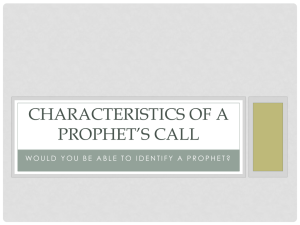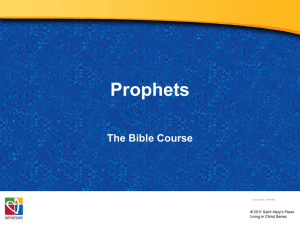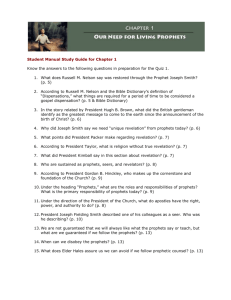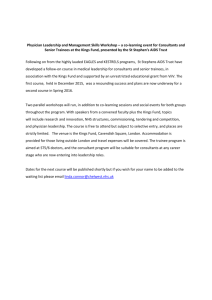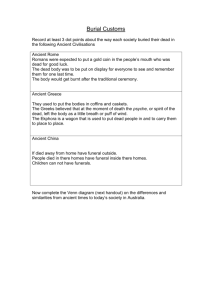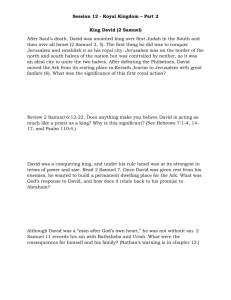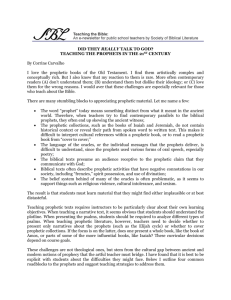B423 Samuel Kings Syllabus - McCormick Theological Seminary
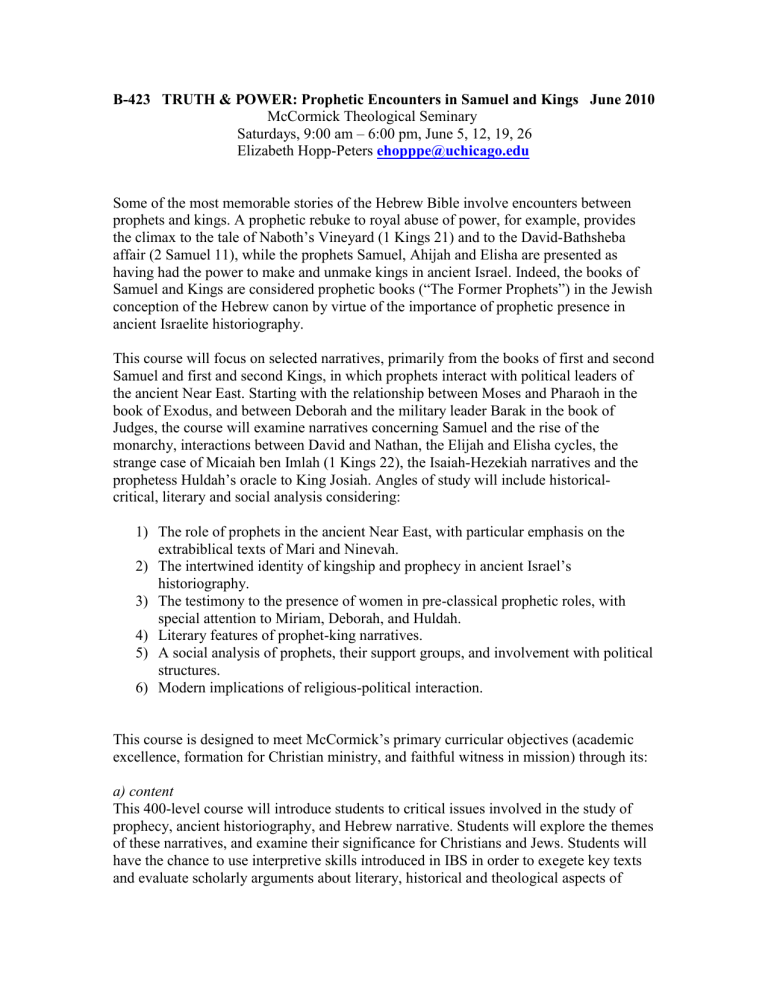
B-423 TRUTH & POWER: Prophetic Encounters in Samuel and Kings June 2010
McCormick Theological Seminary
Saturdays, 9:00 am – 6:00 pm, June 5, 12, 19, 26
Elizabeth Hopp-Peters ehopppe@uchicago.edu
Some of the most memorable stories of the Hebrew Bible involve encounters between prophets and kings. A prophetic rebuke to royal abuse of power, for example, provides the climax to the tale of Naboth’s Vineyard (1 Kings 21) and to the David-Bathsheba affair (2 Samuel 11), while the prophets Samuel, Ahijah and Elisha are presented as having had the power to make and unmake kings in ancient Israel. Indeed, the books of
Samuel and Kings are considered prophetic books (“The Former Prophets”) in the Jewish conception of the Hebrew canon by virtue of the importance of prophetic presence in ancient Israelite historiography.
This course will focus on selected narratives, primarily from the books of first and second
Samuel and first and second Kings, in which prophets interact with political leaders of the ancient Near East. Starting with the relationship between Moses and Pharaoh in the book of Exodus, and between Deborah and the military leader Barak in the book of
Judges, the course will examine narratives concerning Samuel and the rise of the monarchy, interactions between David and Nathan, the Elijah and Elisha cycles, the strange case of Micaiah ben Imlah (1 Kings 22), the Isaiah-Hezekiah narratives and the prophetess Huldah’s oracle to King Josiah. Angles of study will include historicalcritical, literary and social analysis considering:
1) The role of prophets in the ancient Near East, with particular emphasis on the extrabiblical texts of Mari and Ninevah.
2) The intertwined identity of kingship and prophecy in ancient Israel’s historiography.
3) The testimony to the presence of women in pre-classical prophetic roles, with special attention to Miriam, Deborah, and Huldah.
4) Literary features of prophet-king narratives.
5) A social analysis of prophets, their support groups, and involvement with political structures.
6) Modern implications of religious-political interaction.
This course is designed to meet McCormick’s primary curricular objectives (academic excellence, formation for Christian ministry, and faithful witness in mission) through its: a) content
This 400-level course will introduce students to critical issues involved in the study of prophecy, ancient historiography, and Hebrew narrative. Students will explore the themes of these narratives, and examine their significance for Christians and Jews. Students will have the chance to use interpretive skills introduced in IBS in order to exegete key texts and evaluate scholarly arguments about literary, historical and theological aspects of
these prophetic books. Students will consider how these texts can serve as sources of spiritual and ethical inspiration, as well as preaching and teaching resources for the church in today’s world. b) teaching/learning process
The course will allow students to encounter and re-encounter important prophetic narratives at the heart of the Old Testament. Through class discussion, lecture and small group work, as well as through student presentations and individual study, class members will focus on the biblical texts while exploring key interpretive issues and assessing relevancy to modern contexts. Each student will have the opportunity to research a passage in depth in order to write an exegesis paper, to lead a bible study session on a particular narrative, and to compose a prayer or liturgy based on a prophetic text. c) resources
The course will focus on English translations of the Old Testament, but also will explore the Hebrew Massoretic Text that lies behind the translations. Students who can read
Hebrew will have the chance to use their skills and share their insights with class members who cannot. Knowledge of Hebrew is not required. In addition, the course will utilize the following secondary literature (required books indicated by *):
Alter, Robert. The Art of Biblical Narrative.
Harper Collins, 1981.
*Amit, Yairah. Reading Biblical Narratives: Literary Criticism and the Hebrew Bible.
Minneapolis: Fortress, 2001.
*Birch, Bruce C. “The First and Second Books of Samuel: Introduction, Commentary, and Reflections.” In The New Interpreter’s Bible.
Vol. 2:947-1383. Nashville:
Abingdon, 1998.
Blenkinsopp, Joseph. A History of Prophecy in Israel.
Revised edition. Louisville:
Westminster John Knox, 1996.
*Gafney, Wilda. Daughters of Miriam: Women Prophets in Ancient Israel.
Minneapolis:
Augsburg Fortress, 2007.
*Hester, David. First and Second Samuel.
Interpretation Bible Studies. Louisville:
Westminster John Knox, 2005.
Malamat, Abraham. Mari and the Early Israelite Experience.
Oxford:British Acadamy,
1989.
Matthews, Victor. Social World of the Hebrew Prophets.
Peabody, Mass.: Hendrickson,
2001.
Nissinan, Martti. Prophets and Prophecy in the Ancient Near East.
Atlanta: SBL, 2003.
Peterson, David. The Prophetic Literature: An Introduction.
Louisville: Westminster
John Knox, 2002.
*Pixley, Jorge.
Biblical Israel: A People’s History.
Minneapolis: Augsburg Fortress,
1992.
Rofé, Alexander.
The Prophetical Stories.
Jerusalem: Magnes Press, 1988.
*Seow, Choon-Leong. “The First and Second Book of Kings: Introduction, Commentary, and Reflections.” In
The New Interpreter’s Bible.
Vol. 3:1-295. Nashville:
Abingdon, 1999.
*Sharp, Carolyn J. Old Testament Prophets For Today.
Louisville: Westminster John
Knox, 2009.
*Sweeney, Marvin. First and Second Kings.
Old Testament Library. Louisville:
Westminster John Knox, 2007.
Wilson, Robert R. Prophecy and Society in Ancient Israel.
Philadelphia: Fortress, 1980.
Schedule
June 5 – I Samuel and Prophets in the Ancient Near East;
Spotlight on Moses, Balaam, Deborah & Samuel
June 12 – II Samuel and Biblical Storytelling;
Spotlight on Nathan & Gad
June 19 – I Kings and the Israelite Monarchy;
Spotlight on Ahijah, Elijah & Micaiah ben Imlah
June 26 – II Kings and Truth-telling in Today’s World;
Spotlight on Elisha, Isaiah & Huldah.

